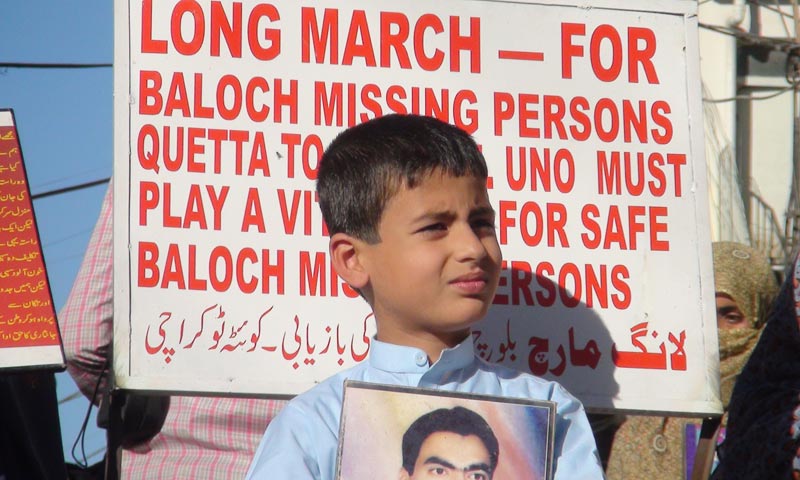
The miserable situation our nation faces is readily apparent in the sad fact that a debate emerged about who between our soldiers and the terrorists attacking us is and is not worthy of the title ‘shaheed’. Interior Minister Chaudhry Nisar termed the debate as ‘poisonous‘, but the truth is it is but a symptom of the poison that has already been unleashed in our veins. With due respect to the Minister, we cannot find a cure if we continue to ignore the sickness.
One person willing to examine the patient in an objective light is respected professor of international law Waris Husain. In a piece yesterday, he makes the point that ‘it becomes harder to assign legitimacy and bestow the honour of martyrdom to criminals, if/when the state represents and respects the rule of law for all its citizens’. In his piece, he refers to secret support for US drones, but on Twitter he expanded on this and included another important example: missing persons.
@newpakistan and it’s not just drones but torture/disappearnces/kidnappings by Pak state tht undermine its position as guardian of law/order
— Waris Husain (@warishusain) November 15, 2013
While undue attention is paid to the deaths of militants like Hakimullah Mehsud and Nasiruddin Haqqani, thousands of innocent Pakistanis are missing due and possibly dead with no judicial hearing or legal rights. The Supreme Court occasionally takes up this issue, but just as quickly disposes of it with no resolution.
Since 20 days, though, people are taking their suffering to the streets and leaving a trail of blood that they hope will lead to the missing.
The 730-kilometers Long March of the family members of the disappeared persons from Balochistan has covered more than 600 kilometers and entered its 20th day. The Long March starts each day at 6 am and ends at 6 pm, covering an average of more than 20 kilometers each day. Many participants have suffered bruised and blistered feet but have not been provided with any medical treatment even though some of them can only walk with the aid of sticks. Their bleeding wounds have wrapped with nothing more than pieces of cloth. No philanthropist organizations or individuals have provided ambulances despite several requests from the protesters.
The Long March has started attracting the attention of media houses. However, the coverage is not at all sufficient in the face of the intensity of the issue of disappearances and extrajudicial killings.
The historical Long March will reach Karachi, the capital of Sindh province, on November 21 after covering the remaining 150 kilometers. The protestors will then start a hunger strike in front of the Karachi Press Club for the recovery of disappeared persons and against extrajudicial killings.
One participant, Ms. Farzana Majeed, the sister of a student leader Mr. Zakir Majeed, who was arrested by the security forces in 2009 and has been missing since then told media persons that two years earlier she had confirmation that her brother was alive and under detention by the military at Quli camp. She said her brother was able to send her prayer bead with his name inscribed on them through a person who was released after spending a year in the camp. In 2010 the National Crisis Management Cell, a government body, claimed that Zakir returned home in January 2010 but his family denies this. After receiving the prayer beads the family hopes and prays that he would be released soon.
Ms. Farzana Majeed told the daily Dawn that every day she moves from one city to another setting up protest camps outside various press clubs, attending court hearings and organising rallies in collaboration with the families of hundreds of other young Baloch men who have disappeared. In search of her brother Farzana has knocked on all the doors. Each time she hears about a tortured and abandoned body found somewhere in Karachi or Balochistan, she rushes to the morgue, praying that it will not be her brother. However, with each passing day Farzana’s hope for the recovery of her brother is fading away.
Balochistan has been facing the worst kind of state sponsored terrorism since 2001 when the military started arresting activists and political workers and killing them extrajudicially after detaining them for long periods in military torture cells. The nationalist groups in Balochistan claim that up to the present day 18,000 persons are missing or have been extrajudicially killed whereas independent sources claim that more than 6,000 persons are missing after their arrest. It is also reported that since June 2010, 730 missing persons were extrajudicially killed after their arrest and disappearance. The government of Balochistan has itself confirmed the extrajudicial killings of 530 persons during the same period. The official list also confirms that 2,500 persons are missing after their arrest.
The government of Balochistan and the federal government have not taken any steps to enter into dialogue with the long marchers, including the Voice for Missing Baloch Persons (VMBP), the organizer of the Long March. It looks as it both governments are showing their loyalty to the state security forces who are accused of arresting and disappearing the victims and who are also the main perpetrators of extrajudicial killings.
The Asian Human Rights Commission wishes to send a stern warning to the Federal Government and the government of Balochistan that if any harm befalls any of the marchers the responsibility will be directed at them. The AHRC also urges the government of Sindh to provide medical and any other assistance that may be required by the marchers. The government of Sindh must not follow the dreadful example of the Balochistan and Federal Governments but rather prove itself to be humane.
![]()





